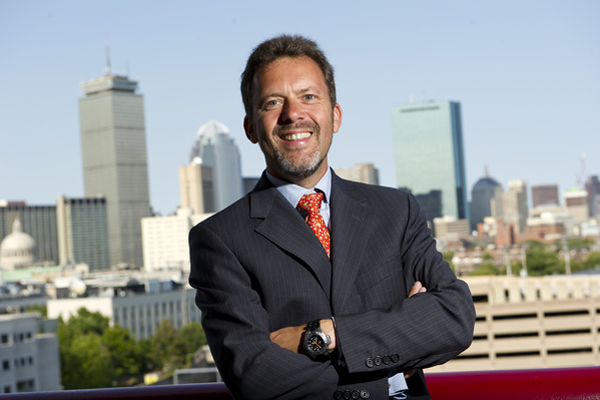An economics approach to sustainability

Matthias Ruth had long been interested in environmental issues but found it hard to use his own discipline—economics —as a tool to unite economic decision making with industrial and urban constraints. “Economists are really good at developing models of things that are traded in markets, but a lot of things we value—like the environment—have no market and no price,” said Ruth, who is joining Northeastern’s faculty this fall as a professor with joint appointments in the College of Social Sciences and Humanities’ School of Public Policy & Urban Affairs and the College of Engineering.
Ruth quickly found himself at the forefront of a new field, ecological economics, and discovered he would need to move from the development of theoretical models that do justice to core principles in economics, ecology and physics to models useful to decision makers. Much of his work uses real data to help industries reduce their carbon footprints while remaining competitive.
But he also investigates how cities plan for the next century because, he says, even if global carbon emissions were cut overnight, the earth will suffer the consequences of climate change for at least the next two centuries. While much attention is given to emissions from the industrial and transport sector of regional and national economies, comparatively little research is done on the options for cities to reduce the climate impacts and other environmental insults.
“We build infrastructure to last 100 years, but we build it with criteria based on the past,” Ruth said. “Climate is going to change—is already changing—the environment in which we live. We need to plan for the new conditions under which cities must operate.”
Ruth joins Northeastern from the University of Maryland, where he was the Roy F. Weston Chair in Natural Economics, founding director of the Center for Integrative Environmental Research, director of the Environmental Policy Program in the School of Policy and founding co-director of the Engineering and Public Policy Program in the A. James Clark School of Engineering and the School of Public Policy. He holds a Ph.D. in geography from the University of Illinois, Urbana-Champaign and a master’s degree in economics from the Ruprecht-Karls-Universität Heidelberg in Germany.
He hopes to continue his interdisciplinary approach to sustainability at Northeastern, working with a broad constituency to address climate and sustainability issues.
“These are problems that cannot be solved by one person in one discipline,” Ruth said.
Instead, he plans to engage people from across the university community to create new and innovative approaches to environmental challenges facing urban areas.
“I’m a firm believer that you have to live what you preach,” Ruth said. “Our own campus is a microcosm of the city. We must engage students, faculty, staff and the organizations in the community around campus to continue Northeastern’s commitment to sustainability research and practice, both on campus and across the globe.”




